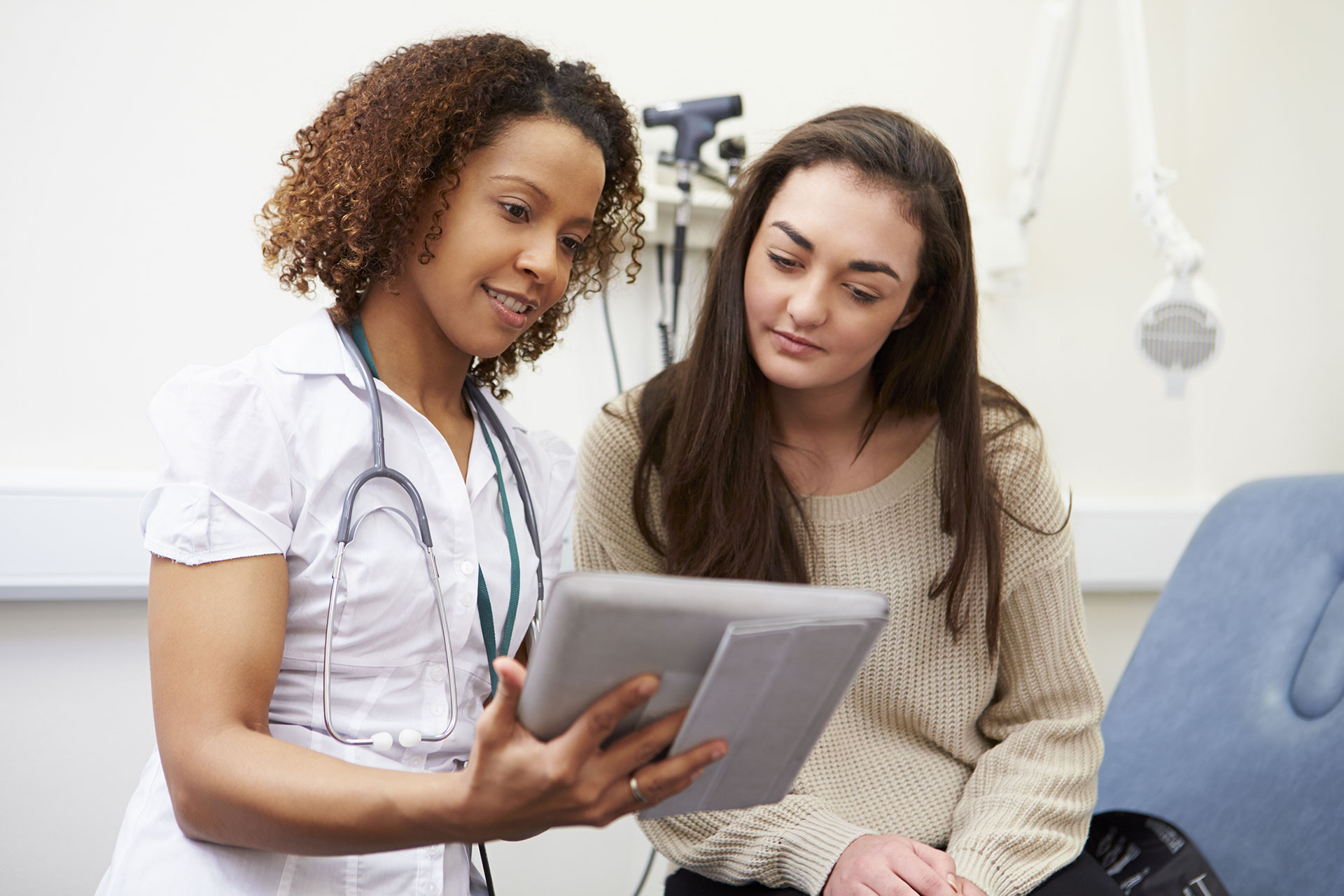At Choices Women’s Medical Center, we provide expert, compassionate care tailored to meet your individual needs. Whether you’re scheduling an annual well-woman exam, navigating menopause, seeking prenatal care, or addressing gynecological concerns, our dedicated team is here to support your health and well-being at every stage of life.

CHOICES is licensed by the State of New York as an Ambulatory Surgery Center to perform certain types of Gynecological procedures. If your care requires surgery in a hospital facility, an experienced CHOICES physician credentialed at a hospital close to CHOICES can perform the following Gynecological procedures:
Diagnosis and treatment of conditions affecting the vulva.

Whether you’re visiting for an annual check-up, birth control, or a specialized GYN procedure, our team at Choices Women’s Medical Center is here to support you every step of the way.
Call us today at 718-786-5000 or book online now to schedule your appointment and experience the care you deserve.
Gynecology Frequently Asked Questions (FAQ) at CHOICES Women’s Medical Center are included on this page. Frequently Asked Questions are answered about Abortion in General, Abortion Pill, Surgical Abortion, Pregnancy, and CHOICES in General on separate pages. CHOICES is woman-owned and operated by mainly women staff.
Gynecology is medical care that deals with a woman’s reproductive system. Gynecology is about keeping women healthy as well as treating medical conditions and illnesses having to do with the reproductive system.
Dedicated to the highest quality of patient care, Choices Women’s Medical Center serves women of all ages, cultures, nationalities, and gender identities with complete confidentiality. Regardless of the questions you have or the symptoms you may be experiencing, CHOICES can help. Our gynecologists provide services that are based on the most up-to-date medical information and treatment. Our same-day and walk-in appointment options make it easy for you to get all of your questions answered as quickly as possible.
According to the American College of Obstetricians and Gynecologists (ACOG), the nation’s leading group of physicians dedicated to improving women’s health, your first visit to a gynecologist should be between the ages of 13 years and 15 years. The first visit can range from just a talk between you and your doctor to having certain testing or exams done. All information shared with your provider is kept confidential.
CHOICES serves women and girls of all ages. Sexual health services, including free education sessions for schools, is an important part of our work. Free Pregnancy Testing, Birth Control, Abortion Options, Counseling, GYN Exams, STI Testing and Treatment – CHOICES has everything teens need for sexual and reproductive health. CHOICES' staff is knowledgeable and sensitive to issues and concerns about gender identity, sexual orientation and healthy relationships. There are no age restrictions, and you do not need parental or anyone’s permission for any of our services. We encourage teens to include a parent or other trusted adult in their healthcare discussions and decisions, but it is not required, and our services are completely confidential. We take credit cards and all insurances, and financial help is available. Call us, and we will be glad to help you make an appointment for whatever you need.
Yes. You can make an appointment for the same day or walk in for immediate GYN care. CHOICES offers GYN appointments Tuesday-Saturday from 8 am-5 pm. CHOICES is easy to reach from any part of New York City by public transportation.
Your appointment will cover any questions you may have about your reproductive health, including birth control options, problems with your monthly period, Sexually Transmitted Infections (STIs), and pregnancy-related concerns. It is also the time for you to raise any troublesome conditions or symptoms you may have but don’t know what they may indicate. Every three years, women 21-29 years old should get a PAP test (see below), as part of a Well-Woman Exam. Every five years women 30-65 should get a PAP Test and HPV Test or a PAP Test alone every three years. Well Woman Exams will go over all the things you need to know and do to keep healthy.
A Pap test (also known as a Pap Smear) is a test for cervical cancer. It is one of the most important gynecology tests a woman should have on a regular basis to keep healthy. In an examination room, the doctor gently swabs a tiny sample of cells from the patient’s cervix (the opening of the uterus). The sample is then sent to a lab to test for any abnormal cells. Abnormal cells do not mean the patient has cervical cancer, but further tests may be needed.
All women ages 21-29 years old should get a Pap Test every 3 years. Women 30-65 should get a PAP Test and HPV Test every five years or a PAP Test alone every three years. Women over 65 do not need a PAP screening.
CHOICES serves people of different gender identities, and our staff is experienced with issues of particular concern to the LGBTQ communities. CHOICES is proud of our history of serving the needs of people of all cultures, nationalities, gender identities and ages.
We have many ways to work out payment so that gynecological care, including abortion services, can be free or low-cost. If you qualify, you can get free birth control by enrolling on-site at CHOICES for the New York State Family Planning Benefit Program or Family Planning Extension Program. We take credit cards and all insurances, and financial help is available. Call us, and we will be glad to help you make an appointment for whatever you need.
Yes. Sexually transmitted infections (STIs) and diseases (STDs) are spread through intimate sexual activity: vaginal, anal and oral sex. Many can be cured. Others cannot. But all STIs and STDs can be treated. These include Herpes, Trichomoniasis, Gonorrhea, Chlamydia and HIV/AIDS. Early diagnosis and treatment is essential to prevent serious health problems. Visit the special page on our website to learn more.
The only way to know for sure is to get tested. Both men and women, all ages and gender identities can get tested at CHOICES. If you think you have been exposed to a sexually transmitted disease (STI/STD) or have symptoms like an unusual discharge, itching, a rash or anything that doesn’t feel normal, contact us immediately for an appointment.
CHOICES offers many different types of birth control, and its team of experienced and knowledgeable health care providers created the ESPC Model to help you to select the type that is right for you.
E–Effectiveness: Some methods are less than 50% effective; others are over 99% effective. How important is it for you to avoid pregnancy?
S-Safety: There are benefits and risks to every type of birth control and every patient reacts differently. By taking your health history into consideration, a CHOICES' health care professional will recommend the safest type of birth control for you.
P-Personality: The CHOICES' counseling staff and dedicated health care providers will take the time to get to know you in order to help select the method of birth control that best suits you needs, likes, dislikes and lifestyle.
C-Cost: Birth control ranges in price from $0-$1,500 depending on which method you choose. Most insurances will cover the cost of your birth control. If you qualify, you can get free birth control by enrolling on-site at CHOICES for the New York State Family Planning Benefit Program or Family Planning Extension Program.
Click here to learn more about all birth control options available at CHOICES.
An IUD, which stands for intrauterine device, is a tiny t-shaped device made of plastic (hormonal IUD) or copper (Paragard copper IUD) that is inserted into the uterus to prevent pregnancy. Once it is inserted it can last up to 10 years, so it is a long-term option for birth control. However, it can be removed at any time should you decide you want to get pregnant or just don’t want it anymore.
CHOICES offers different types of IUDs, so it’s important to know the difference to determine which IUD might be best for you. There are two main types of IUDs, hormonal IUDs and non-hormonal IUDs. Mirena, Kyleena, and Skyla are all types of hormonal IUDs (meaning they work by releasing hormones into your uterus that work to prevent pregnancy). The Paragard is a non-hormonal IUD that is wrapped in copper. The copper kills any sperm so that it can’t fertilize eggs. Learn more about IUDs here.
HPV (Human papillomavirus) is a very common STD (sexually transmitted disease). It is the leading cause of cervical cancer.
The HPV Vaccine also known as Gardasil has been tested and proven to help protect people from most types of HPV that cause cervical cancer. It is most effective before a woman or teen begins to have sex. It is given in 3 shots over a 6-month period. Anyone from ages 9-26 can get the shots. Some women over 26 to age 40 may be able to get the shot.
CHOICES is licensed by the State of New York as an Ambulatory Surgery Center to perform certain types of Gynecological procedures. Colposcopy is a procedure that enables your gynecologist to get a close look at your cervix. The exam takes 5 to 10 minutes, and the process is similar to getting a Pap smear. If abnormal cells are found, the Cryotherapy procedure can treat both harmless and malignant tissue damage. Your doctor also may recommend LEEP or another treatment to remove abnormal cells from your cervix. CHOICES' doctors perform all procedures in our Choices Women’s Medical Center. If your care requires surgery in a hospital facility, an experienced CHOICES' physician credentialed at a hospital close to CHOICES can perform many gynecological surgical procedures.
Choices Women’s Medical Center is located at 147-32 Jamaica Avenue, Queens, NY 11435, just two blocks from the Long Island Rail Road’s Jamaica Station and multiple New York City subway lines. For our out-of-town patients, we are also close to Kennedy and Laguardia airports. Our main entrance is just off Jamaica Avenue on 147th Street. Look for our blue awning.
Click here for more out-of-town patient information.
GET DIRECTIONS THROUGH
By Car: We are 15-20 minutes away from LaGuardia Airport, approximately 6.2 miles. Get directions here.
We are 15-20 minutes away from John F. Kennedy International Airport, approximately 4.5 miles. Get directions here.
By Car: Our Clinic is approximately 1 hour away from Pennsylvania Station Amtrak Train, approximately 13 miles. Get directions by car.
By Train: Long Island Rail Road operates a train from New York Penn Station to Jamaica every 10 minutes. The journey takes 21 min. Get directions.
CHOICES understands and respects that not every person with the capacity for pregnancy identifies as a woman. We respect each individual’s gender identity, expression, and experience, and desire to be helpful and compassionate to all who need information about abortion or support. As an expression of this concern, CHOICES initiated the first Trans Health Care Program in New York State in 2016.
While we do make an effort to use gender-inclusive language (person/people/they/them/patient) throughout our website, we do of course use woman/women/girls. We do so in order to acknowledge the long history of gender discrimination targeting women, the specialized health care that we provide, our experience with hundreds of thousands of women using our services and the biological reality that only people with uteruses are biologically capable of becoming pregnant and carrying a fetus.
If you live in a state where you can’t get an abortion, Choices Women’s Medical Center, founded in 1971, can provide you with an immediate, safe, and confidential appointment for abortion up to 24 weeks.
With the new changes to laws, it has become difficult, if not impossible to receive an abortion in many states. We will help you come to CHOICES to receive the highest quality abortion care. We can help you with travel details including airfare and housing, the costs of your trip, and the cost of your abortion.
Our Out-of-Town Program was created with your needs in mind. In most cases, you can get an appointment within 1-3 days. New York State allows abortion up to 24 weeks with NO limitations. NO age restrictions. NO requirements that you notify parents or partners, NO waiting periods.
Learn More Here.
CHOICES will never turn patients away simply because they can’t afford care. If you’re one of the many people wondering, “Where can I get free or low-cost health services?” staff members will help create a financial plan that suits each patient’s individual circumstances, including Emergency Medicaid, because no one should have to compromise the quality of their health care due to their economic status. Learn More Here.
CHOICES accepts most private insurances, subject to verification:
We are currently hiring for multiple full and part-time positions. Learn more on our Indeed Page.
CHOICES believes that cost should never keep a person from having access to health care. If you’re asking, “Where can I get free or low-cost health services?” our Financial Counselors can help you apply on-site to government programs that can cover your medical care. You can apply in the morning and get services that same day. We take most insurances and work closely with nonprofits that fund abortion services and help with transportation and overnight housing for patients who need it. We take credit cards, cash and can arrange payment plans. Learn More Here.

Our team of board-certified medical professionals and support staff offer safe, trusted, comprehensive care and services at the highest level. Our state-of-the-art facility is located in the heart of Jamaica Queens, NY.
Schedule an appointment with CHOICES today.